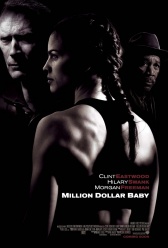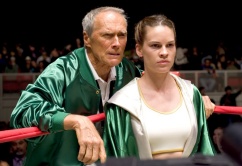| Million Dollar Baby |
| |
 |
USA, 2004. Rated PG-13. 137 minutes.
Cast:
Clint Eastwood, Hilary Swank, Morgan Freeman, Jay Baruchel, Mike Colter, Lucia Rijker, Brian O'Byrne, Anthony Mackie, Margo Martindale, Riki Lindhome, Michael Peña, Bento Martinez, Bruce MacVittie
Writers: Paul Haggis, based on stories from Rope Burns, by Jerry Boyd (writing as F.X. Toole)
Original Music: Clint Eastwood
Cinematography: Tom Stern
Producers: Clint Eastwood, Paul Haggis, Tom Rosenberg, Albert S. Ruddy
Director: Clint Eastwood
LINKS
|
 t the tender age of seventy-four, Clint Eastwood's reputation as one of the top directors in Hollywood continues to grow. In his latest effort, in which he also stars, Eastwood turns to the boxing ring to search for meaning and redemption. Though Million Dollar Baby weighs in as another solid entry on Eastwood's resume, Paul Haggis's overly programmed script stages a fixed fight.
t the tender age of seventy-four, Clint Eastwood's reputation as one of the top directors in Hollywood continues to grow. In his latest effort, in which he also stars, Eastwood turns to the boxing ring to search for meaning and redemption. Though Million Dollar Baby weighs in as another solid entry on Eastwood's resume, Paul Haggis's overly programmed script stages a fixed fight.
Clint Eastwood is—let's see if you can guess, shall we? Did you guess “grizzled, cantankerous, washed-up vet with a dark past?” You did? Congratulations!
Morgan Freeman is—can you get this one, too? Did you guess “damaged, world-weary conscience of the film”? You did? Good job!
Let's try one more. They mentor Hilary Swank, who plays…what? Did you guess “spunky, gritty aspiring boxer with the odds stacked against her?” You did?
These guys are about as surprising as a Hollywood divorce. Then again, Eastwood has never sought to be unpredictable. In his best work, he turns the clichés back into the archetypes from which they sprang, making stories that reflect universal struggles and desires. Often his movies gravitate toward heroes on the downside of their careers grappling with gray morality as they search for redemption.
Unforgiven is a simple story of a reformed killer who falls off the wagon by accepting one last contract, but Eastwood turns into a brutal deconstruction of the myth of Eastwood's own iconic Man with No Name. In Mystic River, loss and revenge tear three childhood friends apart. In Space Cowboys, a much lighter film, four retired astronauts get a shot at saving the world. Sometimes, however, the pursuit of redemption overburdens a too-thin story—like in the formulaic Blood Work (in which Eastwood struggles with a heart transplant as he hunts for the organ donor's killer) and the unlikely Absolute Power (in which Eastwood, an over-the-hill burglar, witnesses the president of the United States murder his mistress and decides to fight for justice).

Clint Eastwood and Hilary Swank contemplate an opponent in Million Dollar Baby. |
Like in Eastwood's lesser films, thematic content overwhelms Million Dollar Baby. Character needs and compulsions do not drive the story; rather, events happen out of thematic necessity. What happens is what needs to happen in order for the script to make the points it wishes to make. Even when Million Dollar Baby takes an unexpected, improbable turn, it becomes immediately obvious in hindsight that all the setup has directed the film to this moment, and only this moment.
All films manipulate, of course, to guide the audience to desired emotions and ideas. The art lies in not allowing the audience to notice the manipulation—in letting the characters control events and take the audience to a destination in an organic way, as a product of believable events and decisions, instead of as a product of what the screenwriter obviously wants to happen. In Million Dollar Baby, the characters begin as such tired constructions that the actors struggle to establish their individuality. Though they eventually succeed, the characters—their desires, their choices—never assert control over the story.
Perhaps we can suspend disbelief to accept that a thirty-one year old woman, Maggie (Swank), can rise to the top of the contender ranks via guts, determination, and instinct, despite possessing no fighting technique or ring experience. (“Tough ain't enough,” intones the movie by way of explanation.) Maybe we can even accept that Frankie (Eastwood) is such an amazing trainer and tactician that a few acerbic words to his ward is consistently enough to turn any fight around. That Frankie (Eastwood) has an estranged daughter, however, and Maggie walks into his boxing gym as a ready-made surrogate is obvious in the extreme. Moreover, how can we accept broken-down Eddie (Freeman), an ex-boxer who lives at the gym, as a real person when he serves virtually no story function? Eddie is there purely as Narrator/Greek Chorus/Reminder of the Past, and his speechifying about who Frankie is and why he blames himself sets the course of the film in stone. Then, straight out of Central Casting, we get Maggie's horribly selfish, Welfare-cheating, trailer-trash relatives. And what are we to make of the East German champion, whose illegal in-fight tactics would shame a professional wrestler, and yet gets away with them over and over because that's what screenwriter Paul Haggis so desperately needs her to do?
Only Clint Eastwood, with his unwaveringly unsentimental approach to even the most syrupy material (see, e.g., his excellent Bridges of Madison County), could have taken such a script and made anything of it. He makes quite a bit of it, actually, creating a coarse, grimly existential commentary on the fleeting nature of dreams, the hardship of pursuing them, and why they're worth chasing anyway. Yet Frankie's boxing-only gym, which like Frankie himself seems a relic of a bygone era, isn't a place where dreams are made. It's an inadequately lit place of empty showboating and self-delusion, and the losers who frequent it don't even pay enough in dues to cover Frankie's costs. Frankie does manage one good fighter, but due to Frankie's overprotective instincts, he—like many others—abandons Frankie upon reaching the Big Time. Naturally, Frankie is the kind of role Eastwood loves to play. Though his performance contains no surprises, he's never done it better, and even allows Frankie moments of weakness—something you don't always see from an Eastwood character.
Swank is as good as Eastwood, if not better. Let's face it—she is not what they call a versatile actor. In her post-Oscar costume fiasco The Affair of the Necklace, she was supremely implausible as a scheming countess conspiring to re-obtain her stripped titles. But neither was her performance in Boys Don't Cry a fluke. Like in that film, Swank conveys in Million Dollar Baby the same sense of dogged determination as an actor that Maggie possesses, methodically and persistently constructing the kind of hardened, unglamorous character for which Swank is best suited, until she inhabits the role instead of affecting a set of demeanors. You never catch an actressy moment from Swank.
Thanks to Eastwood and Swank, the best parts of the film involve the slowly deepening relationship between Frankie and Maggie. Eddie's scenes, on the other hand, would have served better as a filmmaker commentary feature on the DVD release. Even an actor of Freeman's considerable abilities is unable to lift Eddie above being a screenwriter's device. Perhaps casting against type would have helped here, since we're so used to seeing Freeman play guys like Eddie that it's hard for him to give us anything fresh. However, Eastwood doesn't like to see his actors detectably act and is known for allowing them only two or three takes, which argues for casting comfortably and to type.
Million Dollar Baby trafficks in too many clichés, and its unpredictability is largely cosmetic as the story single-mindedly pursues its foregone conclusion. However, Eastwood once again asserts himself as a fine director, and Swank re-establishes herself as a premier actor, thus elevating the material into one of the better big-studio films released in 2005. Million Dollar Baby is manipulative malarkey, but it's exceedingly well-made manipulative malarkey.
Review
© January 2005 by AboutFilm.Com and the author.
Images © 2004 Warner Bros. All Rights Reserved.


